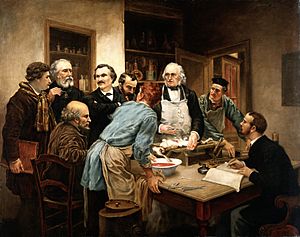Psychoneuroimmunology facts for kids
Psychoneuroimmunology (PNI) is a cool field of study. It looks at how your mind, your nervous system, and your immune system all work together. Think of it as a team effort inside your body!
PNI explores the connections between your nervous system (your brain and nerves) and your immune system (your body's defense team). It also studies how your thoughts and feelings can affect your health.
Contents
How We Learned About This Connection
People have been curious about how our minds and bodies are linked for a long time. Even early doctors wondered if our feelings could affect our health.
Early Ideas About Body Balance
Back in the mid-1800s, a French scientist named Claude Bernard came up with an important idea. He called it "milieu interieur," which means "internal environment." He believed our bodies work hard to keep things stable inside.
In 1865, Bernard explained that our bodies have special ways to keep things like warmth and moisture just right. He said that sickness happens when this amazing system gets out of whack.
Later, in 1932, Walter Cannon, a professor at Harvard University, used the word homeostasis. This term means keeping a stable, balanced state inside the body.
Cannon studied animals and noticed something interesting. When an animal felt strong emotions like anxiety, stress, or anger, its stomach movements would completely stop. His work showed how emotions affect the autonomic nervous system. This system controls automatic body functions, like the famous freeze, fight, or flight response.
The Start of Psychoneuroimmunology
In 1975, two scientists, Robert Ader and Nicholas Cohen, made a big step forward for PNI. They showed how the immune system could be "trained" or "conditioned." This is similar to how a dog can be trained to respond to a bell. They even created the term "psychoneuroimmunology."
Ader was studying how long trained responses lasted in lab rats. He found that rats could be taught to have a weaker immune system just by a taste. This meant a signal from the nervous system (taste) was changing how the immune system worked. It was one of the first clear proofs that the nervous system can affect our body's defenses.
Then, in 1981, David Felten, working at the Indiana University of Medicine, made another amazing discovery. He found a network of nerves that reached blood vessels and even immune system cells.
His team also found nerves in important immune organs like the thymus and spleen. These nerves ended near groups of immune cells like lymphocytes, macrophages, and mast cells. These cells are all super important for fighting off sickness. This discovery helped explain how the nervous system and immune system talk to each other.
Ader, Cohen, and Felten then worked together to edit a very important book in 1981. It was called Psychoneuroimmunology. This book explained the main idea: your brain and your immune system are not separate. Instead, they are one connected defense system for your body.
How Stress Affects Your Health
Stress can have a big impact on your health. For example, one study found that people were more likely to get sick or even die in the month after a very stressful event, like losing a spouse.
Scientists believe that stressful events trigger thoughts and feelings. These, in turn, cause changes in your nervous system and hormones. Ultimately, these changes can weaken your immune system.
When your immune system is weaker, you might be more likely to get infections. It can also affect how certain diseases, like HIV or cancer, progress in the body.
See also
 In Spanish: Psiconeuroinmunología para niños
In Spanish: Psiconeuroinmunología para niños
 | Aurelia Browder |
 | Nannie Helen Burroughs |
 | Michelle Alexander |



